For example, alternate histories set in the 20th century almost universally posit the continued use of zeppelins, and that's just cool. So any comic that opens like this has pretty much got me hooked:
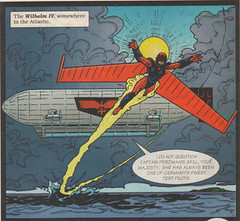
This particular alternate history comic benefits not only from the presence of zeppelins, but from having as its author Will Shetterly. That shot of Hannah Freidman opens Will's Captain Confederacy.
This is actually the second Captain Confederacy series. The first series, which is not in the Last Shortbox, began publication in 1986 and centered on Jeremy Vincent, (the white man in stars-and-bars on the above cover) who is the government-sponsored superhero of the 20th-century CSA (Confederate States of America), anmd the stories mostly centered on internal CSA politics and intrigue.
This mini-series really opens up the stage. Gray has retired as Captain Confederacy, and as Kid Dixie acts as sidekick to the new Captain Confederacy, his fiancee Kate Williams (the African-American woman in stars-and-bars on the cover). They travel to the Louisiana Free State to take part in a "Heroes Conference" with the international array of adventurers/government agents/public relations figures that comprise superheroes in this world.
In addition to Hannah Friedman, Germany's reluctant Iron Falcon, we meet the representatives from the People's Republic of California, the Spirits of the People (think Guardian Angels who kick a little more ass); Lone Star, a cyborg Texas Ranger; Union Maid, the U.S.A.'s supermodel-hero-mascot; Dr. Deseret, a Mormon ninja who uses drugs to increase her physical and sensory capabilities; and an alternate-history, comic-book version of a lucha libre star, Mexico's El Brujo.
The story that spans the four-issue series involves these heroes and several others in the investigation of the murder of Lone Star and theft of his rocket-pistol, and all the action, intrigue, double-crossing and double-teaming that takes place as various political powers, anti-establishment groups, and crooked individuals try to exploit the situation to their advantage. The story is competent if relatively unexceptional, except in its effective blending of spy action and superheroics. Shetterly really shines, however, in creating a credible and plausible alternate world, where political and cultural movements are embodied in the various countries of a balkanized North America. The landscape is full of little thrown-away what-ifs, such as the protagonists heading off to a Jesse Presley performance. Issue 2 contains a click-the-TV-dial montage that gets across this flavor nicely.
Captain Confederacy Nos. 1-4, Nov 1991 - Feb 1992
Writer/colorist: Will Shetterly, Penciler: Vince Stone
Epic Comics
Writer/colorist: Will Shetterly, Penciler: Vince Stone
Epic Comics
This is actually the second Captain Confederacy series. The first series, which is not in the Last Shortbox, began publication in 1986 and centered on Jeremy Vincent, (the white man in stars-and-bars on the above cover) who is the government-sponsored superhero of the 20th-century CSA (Confederate States of America), anmd the stories mostly centered on internal CSA politics and intrigue.
This mini-series really opens up the stage. Gray has retired as Captain Confederacy, and as Kid Dixie acts as sidekick to the new Captain Confederacy, his fiancee Kate Williams (the African-American woman in stars-and-bars on the cover). They travel to the Louisiana Free State to take part in a "Heroes Conference" with the international array of adventurers/government agents/public relations figures that comprise superheroes in this world.
In addition to Hannah Friedman, Germany's reluctant Iron Falcon, we meet the representatives from the People's Republic of California, the Spirits of the People (think Guardian Angels who kick a little more ass); Lone Star, a cyborg Texas Ranger; Union Maid, the U.S.A.'s supermodel-hero-mascot; Dr. Deseret, a Mormon ninja who uses drugs to increase her physical and sensory capabilities; and an alternate-history, comic-book version of a lucha libre star, Mexico's El Brujo.
The story that spans the four-issue series involves these heroes and several others in the investigation of the murder of Lone Star and theft of his rocket-pistol, and all the action, intrigue, double-crossing and double-teaming that takes place as various political powers, anti-establishment groups, and crooked individuals try to exploit the situation to their advantage. The story is competent if relatively unexceptional, except in its effective blending of spy action and superheroics. Shetterly really shines, however, in creating a credible and plausible alternate world, where political and cultural movements are embodied in the various countries of a balkanized North America. The landscape is full of little thrown-away what-ifs, such as the protagonists heading off to a Jesse Presley performance. Issue 2 contains a click-the-TV-dial montage that gets across this flavor nicely.
Ultimately, the story gets resolved in an extended negotiation between the good guys, the pretty good guys, the not-so-bad guys, and the really bad guys - and this might be the series's weak point. Shetterly is an intelligent and thoughtful man, with a strong grasp of politics and social dynamics in the real world; towards the end of Captain Confederacy, the plot can almost feel a little too grounded in realpolitik, and some of the developments have the same tone and timbre as explanations of the Iran-Contra affair.
But this is balanced off with a last minute sharpshooting stunt by Union Maid, clad only in a stars-and-stripes bathrobe, so who am I kidding: Shetterly knows his comic-book business.
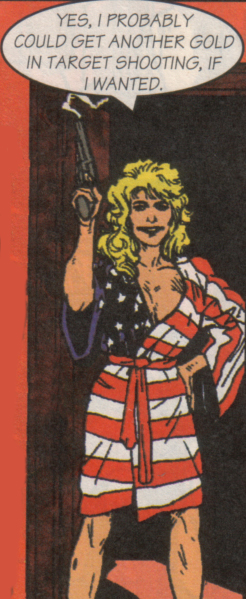
Extra notes:
The original Captain Confederacy series made the news a few weeks back.
Partially in response to that news story, Will Shetterly is posting the entire first series on a blog for your enjoyment. Check it out.
And check out Will's general-interest blog, It's All One Thing, as well. It has been on my read-regularly list for a while now.
Here's Will's response to that news story, so you don't have to dig it out (it's actually on another of his blogs.).
But this is balanced off with a last minute sharpshooting stunt by Union Maid, clad only in a stars-and-stripes bathrobe, so who am I kidding: Shetterly knows his comic-book business.

Extra notes:
The original Captain Confederacy series made the news a few weeks back.
Partially in response to that news story, Will Shetterly is posting the entire first series on a blog for your enjoyment. Check it out.
And check out Will's general-interest blog, It's All One Thing, as well. It has been on my read-regularly list for a while now.
Here's Will's response to that news story, so you don't have to dig it out (it's actually on another of his blogs.).
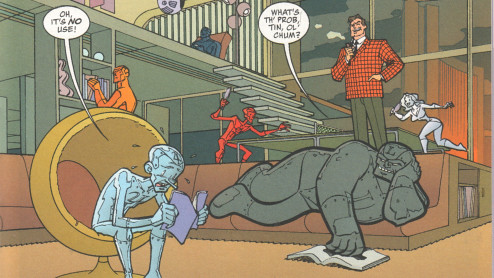
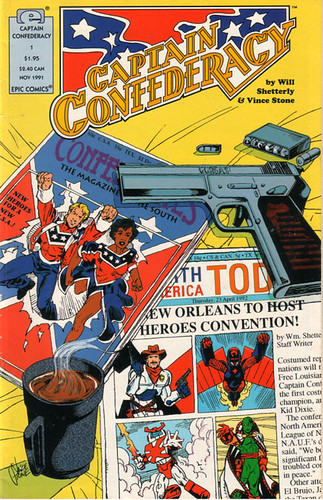
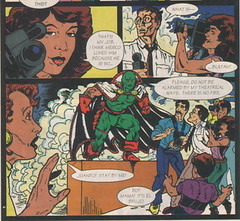
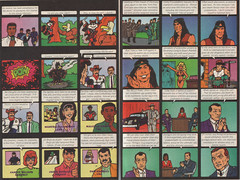


1 comment:
It's fascinating that this comic is finally getting some attention all these years after publication...right when this movie is finally being released after making its debut at Sundance back in 2004.
Post a Comment